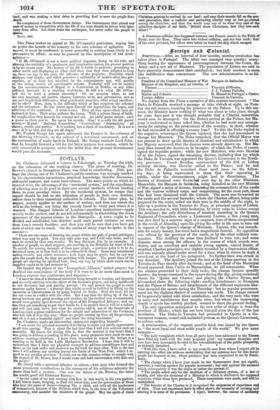SCOTLAND.
'Hr. Chalmers delivered a lecture in Edinburgh, on Tuesday the 13th, -on the education of the working classes. The place of meeting, Dr. Brown's church in Broughton Place, was filled to overflowing. This, per- ham; the closing one of Dr. Chalmers's public orations, was strongly marked by his characteristic earnestness, practical knowledge, fanciful discussion, colloquial manner, and warm benevolence. The main points on which he insisted were, the advantage of the "territorial system," and the expediency of allowing men to do good in their own several methods without binding tiom to your peculiar views. By the territorial system, he means- that -regard should be had to the education of people in their own districts, wither than to their numerical collection in schools. The latter plan, he argues, merely applies to the surface of society, and does not search the evil to the bottom, nor bring the remedy home to every part where it is wanted. The Ragged Schools of London—excellent institutions—apply merely to the surface, and do not tell substantially in diminishing the dense ignorance of the poorest classes in the Metropolis. A town ought to be elivided and subdivided into districts until each parcel contains no more than (say) twenty families; and then you will be sure that you have got hold of every one to teach. On the merits of many ways he spoke in this manner- " There are two ways of drawing the people within the pale of gospel privileges; either way may be good. Yon may take your way, and I will take mine, and let each be tested by their own results. We may illustrate this by an example. A number of people, we shall suppose, are starving in the Hebrides for want of food. To satisfy the craving demands of these poor people, a previous point is to be de- termined upon, as to how food is to be conveyed to them. Some may recommend sailing-vessels, and others steamers: both ways may be good; but by any way give the people food, for they are perishing with hunger. The _great mass of the .people are starving for spiritual food: then, any way by which their wants can be -supplied ought to be had recourse to."
He lauded the object of the "Evangelical Alliance," united prayer; but -doubted the continuance of the body if it were to do no more than meet in London, express fine sentiments, and disperse-
" I have no idea of a thousand ministers being brought to London, and honestly and sincerely entering into the object of the Saviour's prayer, and being indifferent to our Saviour's last and parting precept, 'Go and preach the gospel to every creature under heaven'; a precept that might as well be fulfilled by filling up the vacancies in Christendom as by going beyond its limits. Both are best: let not the one come in conflict with the other. But I say that the filling up of the in- terval between one great meeting and another, by the method now recommended, would have greatly sped forward the object of the Evangelical Affiance; and un- less they get something to put their hands to, I do predict that it will be a failure, and will just sink down into what its enemies call it, one of the theatricals of London—just a great exhibition for the delight and admiration of the Cockneys, who will talk of it in this way, 'Here are people coming up from all the provinces, and oh is it not a beautiful sight?' and there the thing terminates." Dr. Chalmers made an interesting statement regarding himself- " I sin under the physical necessity of declining to make any public appearances in all time coming. This is about the last time that I will ever address such an assembly. My reason for stating this is, that the moment it was heard that I was going to address a meeting in this place, many proposals were made to me to address meetings elsewhere. I have been requested to repeat the lecture to a meeting to be held in the Leith Mechanics Institution. I hope that it will be understood that I have not physical strength to address assemblages here and there, as the task unfits and unnerves me for work for days after. Tins is the last tame [will address any meeting beyond the limits of the West Port, which I re- gard as my peculiar province. I could not on this occasion refuse to comply with the request of Dr. Brown, that I would come and hold conversation with him and his people' He closed with a personal allusion to others,—two men who formed the most prominent recollections in the retrospect of his religious ministry for more than half a century. One was the father of Dr. Brown; the other his uncle, good old Ebenezer Brown— "us the midst of my last meeting with him in this world, in his own parlour, I left him in tears, weeping, as Paul did before him, over the perversities of those who bear the name of Jesus—weeping like a child, and with all the tenderness of womanhood, because of the divisions which then, in the heat of the Voluntary controversy, rent asunder the ministers of the gospel. May the spirit of those Christian patriots be revived in our land; and may their mantle fall on the pre- sent generation, that a catholic and pervading charity may at last go abroad among the churches, and that the world may say of us what they said of the primitive disciples of our faith, Behold these Christians, how they love each other!
A disastrous collision has happened between two French vessels in the Frith of Forth, near the Bass. They came Into violent collision, and one was sunk: four of the crew perished, but others were taken on board the ship which escaped.


























 Previous page
Previous page